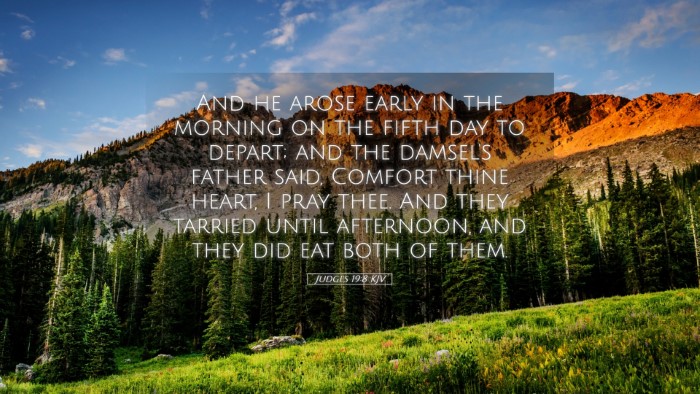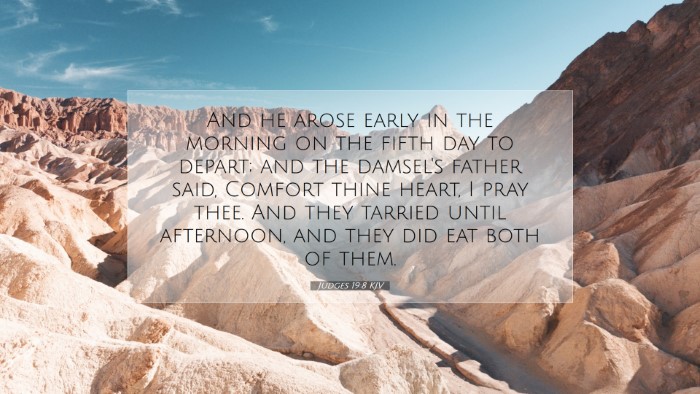Commentary on Judges 19:8
Verse Context: Judges 19:8 states, "And he arose early in the morning on the fifth day to depart; and he said, 'Come, let us be going.' But his father-in-law said, 'Refresh your heart with a morsel of bread, and afterward go your way.'"
Introduction
This verse is found in the narrative of a Levite and his concubine, which serves to illustrate the complexity of social relationships and the moral failings of the period of the Judges in Israel. The brief exchange between the Levite and his father-in-law provides insight into customs and the social dynamics of family, hospitality, and the pressing urgency to depart.
Analysis of Key Themes
-
Hospitality and Social Customs
In ancient Israel, hospitality was a sacred duty. Both Matthew Henry and Adam Clarke emphasize the importance of this cultural practice. The father-in-law’s insistence on providing bread reflects the customary norms of kindness and care, indicating his desire to ensure the traveler is nourished before continuing on a journey. The Levite’s respect for his father-in-law’s wishes showcases the negotiation between familial loyalty and personal urgency.
-
Urgency and Delay
The Levite's urgency in departing early on the fifth day illustrates the tensions of human plans versus divine timing. Albert Barnes notes that this urgency may also reflect an awareness of the moral decline occurring in Israel. The delay requested by the father-in-law raises the question of when personal desires should yield to communal obligations.
-
Significance of the Journey
This journey is emblematic of the tragic events that follow. The Levite’s readiness to depart without fully breaking bread can serve as a metaphor for the spiritual and relational disconnect prevalent in Israel at the time, which would ultimately culminate in catastrophe. As Clarke insightfully notes, this journey becomes a pivotal moment in Israel’s history, one marked by a failure to heed moral and social responsibilities.
Theological Reflections
This passage raises significant theological questions regarding human agency and divine providence. The Levite’s choice to leave is juxtaposed against the hospitality offered by the father-in-law, introducing a tension between personal ambition and communal virtues. The paradox of choosing to pursue one’s own agenda at the expense of relationships is echoed throughout biblical narratives.
Application for Pastors and Scholars
For pastors, this scripture can serve as a reminder of the importance of hospitality in the community of faith. How church communities approach the care of one another can be a reflection of their understanding of God’s grace and love. The way in which relationships are prioritized reveals the moral condition of the church.
For scholars, the cultural insights provided by this passage can enhance understanding of ancient Near Eastern customs, offering depth to biblical interpretation. Additionally, the underlying themes provide a fertile ground for exploring how societal norms influence moral decisions within religious contexts.
Conclusion
Judges 19:8 is more than just a historical account; it is a window into the complexities that define human relationships, social customs, and the moral dilemmas faced by individuals in the pursuit of their own paths. As we reflect on the Levite’s journey, we are called to examine our own lives and the way we navigate between personal desires and our responsibilities to others.
Further Study
In light of this commentary, readers are encouraged to delve into the broader context of the Book of Judges and explore additional themes of moral ambiguity and social justice within the narrative. A deeper understanding of these facets will enrich one’s grasp of biblical teachings on community, hospitality, and accountability in faith.


